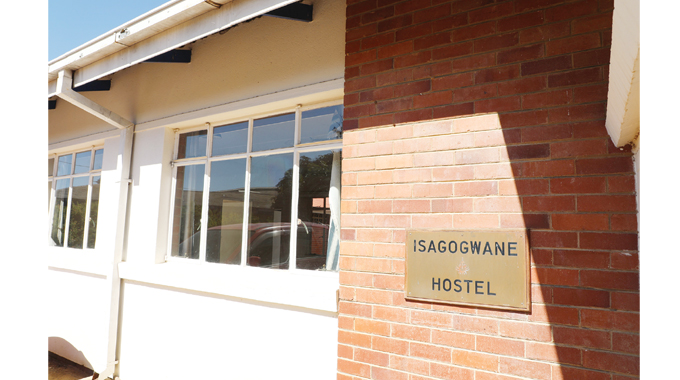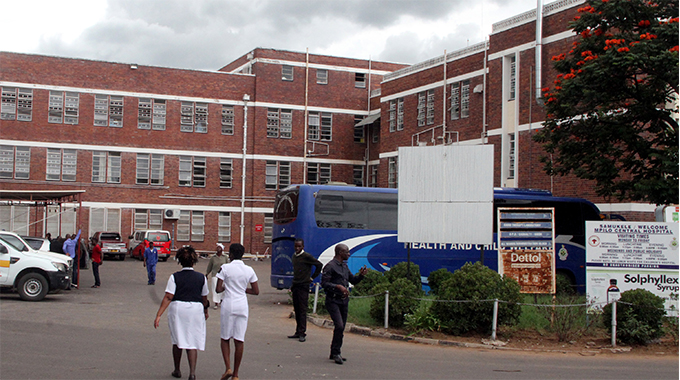Caregiver experiences at Isagogwane Hostel

Thandeka Moyo-Ndlovu, Senior Health Reporter
SWOLLEN legs and excruciating pain from her cancer-infested cervix have rendered her immobile as she can barely take a step away from her bed.
Gasping for air while trying to chase away flies that had gathered around her has brought so much grief to her helpless caregiver who could only assure her that things would be better one day.
Under normal circumstances a painkiller could have saved both the patient and Ms Betty Marovanyanga another sleepless night but she did not have any dime on her.
This is one of the hundreds of sad experiences that Ms Marovanyanga has had while taking care of cancer patients who are accommodated at Isagogwane Unit at Mpilo Central Hospital.

Mpilo Central Hospital
Isagogwane is a Ndebele word for a plant which was believed to have cancer healing properties. However, only a handful make it out of the unit fully recovered from cancer.
The unit houses struggling cancer patients without accommodation in Bulawayo as they await diagnosis and treatment.
Ms Marovanyanga has, however, noted that a majority of these patients who also get meals from Mpilo lead painful lives without resources to buy food or medication.
“I have been here since 2016 as caretaker of this unit and have interacted with patients who have been housed here,” she told Chronicle.
“The most painful thing is to see people languish in pain but there is nothing that you can do to help alleviate the pain they are in.
“Cancer is not only deadly but leaves social wounds because many come without help or an assistant to help them during the process of getting diagnosis and treatment.”
Ms Marovanyanga says one of the patients had to travel back to Gweru without treatment as she could not afford chemotherapy.
“She came alone, with swollen feet and had warts, which made it difficult for her to move. She would cry all night long but couldn’t even afford a pain killer just so she could sleep.
“Her cervical cancer was quite advanced and would have to continuously struggle to keep away from flies, which easily clung to her. The worst day was when she told me she was going back to Gweru since no one from her family was willing to help her with needed drugs. My heart broke,” said the caregiver.

Ms Betty Marovanyanga
She said she had hosted patients from Chiredzi, Masvingo, Binga, Lupane Beitbridge and other areas, which rely on Mpilo for cancer services. Women also account for the majority of people who have sought accommodation at Isagogwane.
“I have seen people with all types of cancers, the growths, the dripping wounds, the stenches and above all the sorrow that comes with having cancer but without any means to get treated.
“The few lucky ones get sponsorship like those living with albinism but the rest suffer until they give up on trying to seek treatment which is beyond their reach,” she said.
“One time a couple was here, an old man and his wife who had cancer. I saw how traumatising it was for him to help her to the toilet, it was just not right.
“Another old woman who came from Plumtree with cervical cancer would cry all night in pain but eventually went back without treatment as she could not afford it,” said Ms Marovanyanga.
Recent statistics show that more than 60 percent of patients are being attended to at Mpilo and other public health institutions have stage three and four cancers. At this stage, the cancer would have advanced so much that it is virtually incurable.
Stage three and four cancers require palliative treatment, which is only meant to treat symptoms or ease pain until the patient dies.
“The major problem is cancer doesn’t have attention despite being a killer disease, people are silent in communities, that is why people present late.
“Secondly cancer treatment is expensive and ordinary Zimbabweans cannot afford it, even those who are working,” she said.
Ms Marovanyanga said a lot of stigma also surrounds cancer diagnosis as some families neglect their own whenever they fall sick.
“I see a lot of physically unfit people coming all alone, unaccompanied to Mpilo. They are not in a position to do the process needed in seeking treatment but they are all alone and cannot move. Some cannot even use the bathroom on their own and I always wonder if they have any family members alive.”
Ms Marovanyanga says her job has helped her appreciate the delicacy of life and the need to have more resources channelled towards cancer treatment.
“We are grateful for the free cancer screening scattered around our communities but we are yet to have free treatment, which will save many lives from the agony they feel when they fail to pay for treatment,” she said.
“We surely need to treat cancer like a deadly disease and invest in equipment. Delays in treatment is killing our people and as individuals we need to get to a point where we treat those infected with love. There is no way we can neglect our cancer patients and expect that only medicine will help them recover, no, they need our support, love and care.”
Isagogwane unit has a capacity to house about 15 patients at a time but sometimes it is extended to accommodate those in need.

Isitshwala/sadza and cabbage
“Our number depends on functional equipment and sometimes we are full especially when the radiotherapy machines are up. The other challenge is when these patients go through chemotherapy, they lose appetite and it’s difficult to encourage them to eat when all they have is hospital food, which can be isitshwala/sadza and cabbage daily.”
She said policy makers should at least consider a cancer levy so that lives can be saved.
“There is nothing as heartbreaking as seeing someone leave this unit without treatment because they cannot afford it,” said Ms Marovanyanga.
“Cancer treatment also comes with a lot of scans and tests which are only accessible in private institutions and this is the reason why people present too late as they cannot afford to go through the necessary process?”
An ideal scenario for Ms Marovanyanga would be where everyone who is diagnosed with cancer has free and accessible treatment just like HIV. — @thamamoe








Comments